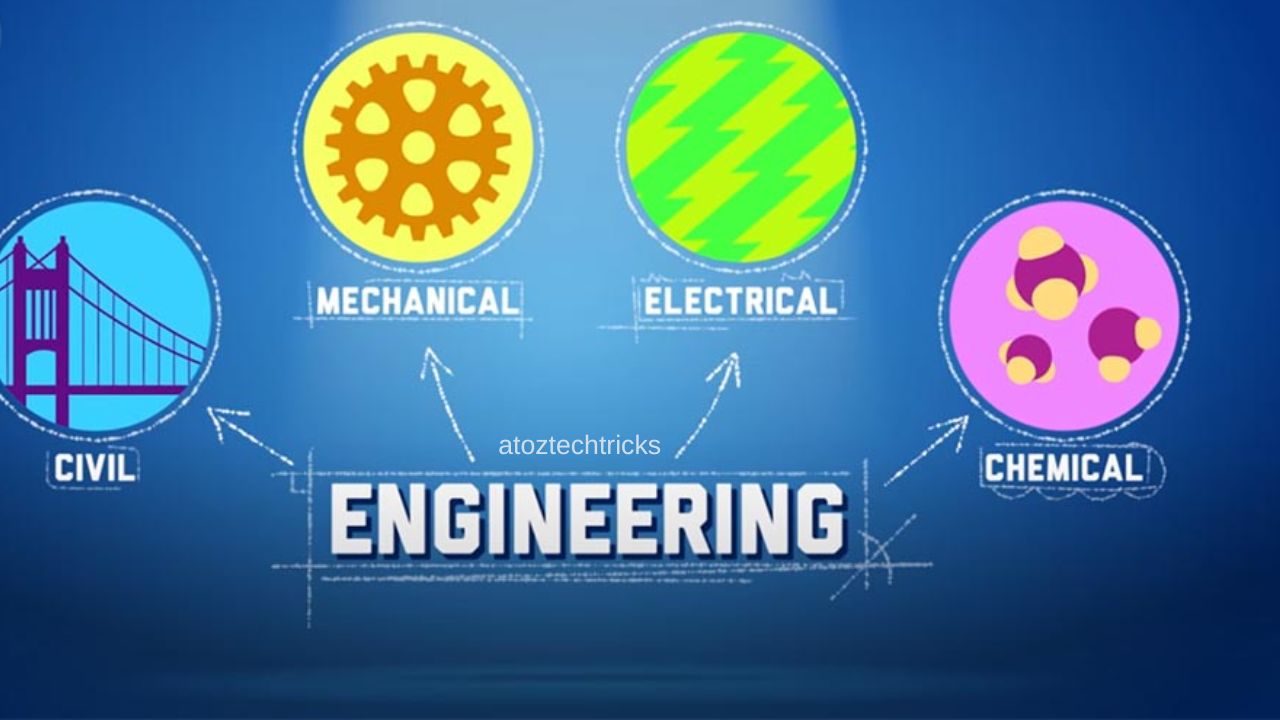Engineering Careers: Exploring Opportunities and Pathways in a Dynamic Field
Engineering is a diverse and dynamic field that offers a wide range of career opportunities. From designing cutting-edge technology to solving some of the world’s most pressing problems, engineers play a crucial role in shaping the future. This article explores various engineering careers, highlighting the different specializations, skills required, and potential career paths for aspiring engineers.
Introduction to Engineering Careers
Engineering is a profession that involves the application of scientific principles to design, build, and maintain structures, machines, and systems. Engineers are problem solvers who use their expertise in mathematics, science, and technology to develop innovative solutions. With the rapid advancement of technology and the growing demand for sustainable solutions, the field of engineering is expanding, offering a plethora of career opportunities across various industries.
Major Branches of Engineering
Engineering is a broad field that encompasses several branches, each with its own focus and career opportunities. The following are some of the major branches of engineering:
1. Civil Engineering
Civil engineering is one of the oldest branches of engineering, focusing on the design, construction, and maintenance of infrastructure projects such as roads, bridges, dams, and buildings. Civil engineers play a critical role in ensuring the safety and sustainability of the built environment. Career opportunities in civil engineering include roles in construction management, structural engineering, transportation engineering, and environmental engineering.
2. Mechanical Engineering
Mechanical engineering is a versatile field that involves the design, analysis, and manufacturing of mechanical systems. Mechanical engineers work on a wide range of projects, from developing new automotive technologies to designing industrial machinery. This branch of engineering offers careers in areas such as aerospace engineering, automotive engineering, robotics, and energy systems.
3. Electrical Engineering
Electrical engineering focuses on the study and application of electricity, electronics, and electromagnetism. Electrical engineers are involved in the design and development of electrical systems, from power generation and distribution to communication systems and electronic devices. Career opportunities in electrical engineering include roles in power engineering, telecommunications, control systems, and electronics design.
Electrical Engineering Careers: Exploring Opportunities and Paths
4. Chemical Engineering
Chemical engineering combines principles of chemistry, physics, and biology to design processes for the production of chemicals, pharmaceuticals, and other materials. Chemical engineers work in industries such as petrochemicals, pharmaceuticals, food processing, and environmental protection. Careers in chemical engineering include process engineering, materials engineering, and environmental engineering.
5. Computer Engineering
Computer engineering integrates electrical engineering and computer science to develop computer systems and software. Computer engineers work on hardware design, software development, and network systems. With the increasing reliance on technology, computer engineering offers a wide range of career opportunities in fields such as artificial intelligence, cybersecurity, software engineering, and data science.
6. Aerospace Engineering
Aerospace engineering is a specialized field that focuses on the design and development of aircraft and spacecraft. Aerospace engineers work on projects related to aerodynamics, propulsion systems, and avionics. Career opportunities in aerospace engineering include roles in aircraft design, space exploration, defence, and satellite communications.
7. Biomedical Engineering
Biomedical engineering is an interdisciplinary field that applies engineering principles to the medical and healthcare industries. Biomedical engineers work on developing medical devices, prosthetics, diagnostic equipment, and biotechnologies. This field offers careers in medical device design, clinical engineering, and research and development in healthcare.
Emerging Fields in Engineering
The field of engineering is constantly evolving, with new technologies and challenges giving rise to emerging specializations. Some of the emerging fields in engineering include:
1. Environmental Engineering
Environmental engineering focuses on developing sustainable solutions to address environmental challenges such as pollution, waste management, and climate change. Environmental engineers work on projects related to water and air quality, renewable energy, and sustainable infrastructure. This field is gaining importance as industries and governments prioritize environmental sustainability.

2. Renewable Energy Engineering
Renewable energy engineering is dedicated to the development and implementation of sustainable energy sources such as solar, wind, and hydropower. Engineers in this field work on designing energy-efficient systems, developing new technologies, and optimizing energy production. With the global shift towards renewable energy, this field offers promising career opportunities.
3. Nanotechnology Engineering
Nanotechnology engineering involves the manipulation of materials at the atomic and molecular levels to create new materials and devices with unique properties. This field has applications in various industries, including electronics, medicine, and materials science. Career opportunities in nanotechnology engineering include research and development, materials engineering, and product design.
4. Robotics Engineering
Robotics engineering is focused on the design, construction, and operation of robots. Engineers in this field work on developing robotic systems for industrial automation, healthcare, and space exploration. Robotics engineering offers careers in areas such as artificial intelligence, machine learning, and autonomous systems.
5. Data Science and Engineering
Data science and engineering involve the collection, analysis, and interpretation of large datasets to inform decision-making and develop new technologies. Engineers in this field work on developing algorithms, data models, and software systems for industries such as finance, healthcare, and technology. With the increasing importance of data in business and technology, this field offers a wide range of career opportunities.
Skills and Qualifications for Engineering Careers
A career in engineering requires a strong foundation in mathematics, science, and technology, as well as a range of technical and soft skills. The following are some of the key skills and qualifications needed for a successful engineering career:
1. Technical Skills
- Mathematics and Science: A strong understanding of mathematics and science is essential for solving engineering problems and designing systems.
- Computer Programming: Proficiency in programming languages such as Python, Java, and C++ is important for many engineering fields, especially computer and software engineering.
- Analytical Thinking: Engineers must be able to analyze complex problems, identify solutions, and evaluate the effectiveness of their designs.
- Technical Writing: Engineers need to document their work and communicate technical information clearly to colleagues, clients, and stakeholders.
2. Soft Skills
- Problem-Solving: Engineers are problem solvers who must be able to think critically and creatively to develop innovative solutions.
- Teamwork: Engineering projects often involve collaboration with multidisciplinary teams, so strong teamwork and communication skills are essential.
- Project Management: Engineers must be able to manage projects, including budgeting, scheduling, and coordinating resources.
- Adaptability: The field of engineering is constantly evolving, so engineers must be able to adapt to new technologies and changing industry demands.
3. Educational Qualifications
- Bachelor’s Degree: Most engineering careers require at least a bachelor’s degree in engineering or a related field. Specialized programs are available for different branches of engineering, such as civil, mechanical, electrical, and chemical engineering.
- Master’s Degree: A master’s degree may be required for advanced positions or specialized fields such as biomedical engineering, aerospace engineering, or environmental engineering.
- Licensing and Certification: In many countries, engineers must be licensed or certified to practice professionally. This typically involves passing exams and gaining work experience.
Career Pathways in Engineering

Engineering careers offer a variety of pathways, depending on the individual’s interests, skills, and qualifications. The following are some common career pathways in engineering:
1. Entry-Level Engineer
Entry-level engineers typically start their careers in junior positions, working under the supervision of experienced engineers. They may be involved in tasks such as data analysis, design, testing, and project management. Entry-level engineers have the opportunity to gain hands-on experience and develop their technical skills.
2. Project Engineer
Project engineers are responsible for overseeing engineering projects from start to finish. They coordinate with team members, manage resources, and ensure that projects are completed on time and within budget. Project engineers play a key role in ensuring the success of engineering projects.
3. Senior Engineer
Senior engineers have extensive experience and expertise in their field. They are responsible for leading engineering teams, designing complex systems, and providing technical guidance to junior engineers. Senior engineers may also be involved in research and development, innovation, and strategic planning.
4. Engineering Manager
Engineering managers are responsible for overseeing engineering teams and projects. They manage budgets, schedules, and resources, and ensure that projects align with organizational goals. Engineering managers also play a key role in mentoring and developing engineering talent within the organization.
5. Research and Development Engineer
Research and development (R&D) engineers work on developing new technologies, products, and processes. They conduct experiments, analyze data, and collaborate with other researchers and engineers to innovate and improve existing systems. R&D engineers play a crucial role in advancing the field of engineering and driving technological innovation.
6. Consultant Engineer
Consultant engineers provide specialized expertise and advice to organizations on engineering projects. They may work independently or as part of a consulting firm, offering services such as feasibility studies, design reviews, and project management. Consultant engineers have the opportunity to work on a variety of projects across different industries.
7. Entrepreneur
Some engineers choose to start their businesses, developing and commercializing new technologies or products. Entrepreneurial engineers combine their technical expertise with business acumen to create innovative solutions and bring them to market. This career pathway offers the opportunity for creativity, innovation, and leadership.
Job Market and Demand for Engineers
The job market for engineers is strong, with a high demand for skilled professionals across various industries. The following factors contribute to the demand for engineers:
1. Technological Advancements
The rapid advancement of technology is driving demand for engineers in fields such as artificial intelligence, robotics, and renewable energy. As new technologies emerge, engineers are needed to design, develop, and implement innovative solutions.
2. Infrastructure Development
Ongoing infrastructure development and maintenance projects require the expertise of civil, structural, and environmental engineers. As cities grow and ageing infrastructure needs to be updated, there is a continued demand for engineers in this field.
3. Environmental Sustainability
The growing focus on environmental sustainability is driving demand for engineers who can develop sustainable solutions in areas such as renewable energy, waste management, and pollution control. Environmental and renewable energy engineers are particularly in demand as industries and governments prioritize sustainability.
4. Healthcare and Biotechnology
The healthcare and biotechnology industries are experiencing rapid growth, leading to increased demand for biomedical engineers and professionals with expertise in medical devices, diagnostics, and biotechnologies. The development of new medical technologies and treatments requires the skills of engineers who can bridge the gap between engineering and medicine.
5. Globalization and Industry 4.0
Globalization and the rise of Industry 4.0 are transforming manufacturing and production processes, leading to increased demand for engineers in fields such as automation, robotics, and data science. Engineers who can work with advanced manufacturing technologies and integrate digital systems into production processes are highly sought after.
Challenges and Opportunities in Engineering Careers

While engineering careers offer many opportunities, they also come with challenges. The following are some of the challenges and opportunities in the field of engineering:
1. Continuous Learning
The field of engineering is constantly evolving, with new technologies and methodologies emerging regularly. Engineers must be committed to continuous learning and professional development to stay up-to-date with the latest advancements. This may involve pursuing additional certifications, attending workshops and conferences, and staying informed about industry trends.
2. Ethical Considerations
Engineers often face ethical dilemmas, particularly in fields such as environmental engineering, biomedical engineering, and artificial intelligence. Engineers must consider the social, environmental, and ethical implications of their work and make decisions that prioritize safety, sustainability, and the public good.
3. Work-Life Balance
Engineering careers can be demanding, with long hours and high-pressure projects. Maintaining a healthy work-life balance can be challenging, particularly in roles that require extensive travel or involvement in multiple projects. Engineers must develop time management and stress management skills to balance their professional and personal lives.
4. Global Opportunities
Engineering is a global profession, with opportunities to work on international projects and collaborate with professionals from around the world. Engineers with language skills, cultural awareness, and experience working in diverse environments have a competitive advantage in the global job market.
5. Innovation and Creativity
Engineering is a field that encourages innovation and creativity. Engineers have the opportunity to develop new technologies, solve complex problems, and contribute to the advancement of society. The ability to think creatively and approach problems from different angles is a valuable skill in engineering careers.
Engineering is a dynamic and rewarding field that offers a wide range of career opportunities across various industries. From traditional branches such as civil and mechanical engineering to emerging fields such as nanotechnology and renewable energy, engineers have the opportunity to work on exciting projects that shape the future. With the right skills, qualifications, and mindset, aspiring engineers can pursue a successful and fulfilling career in this ever-evolving profession.




Post Comment